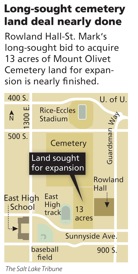This is an archived article that was published on sltrib.com in 2010, and information in the article may be outdated. It is provided only for personal research purposes and may not be reprinted.
A weedy lot on Salt Lake City's east bench that was destined to be filled with tombstones instead will be teeming with teenagers one day now that Rowland Hall is poised to finalize a purchase agreement with Mount Olivet Cemetery.

The deal to convert 13 acres of open space at 1443 E. Sunnyside Ave. into a new campus — in the works for nearly eight years — could be completed next week.
It follows a series of twists and turns that included a private bidding war, pushback from the neighborhood, a zoning change, two extensions and an act of Congress.
Rowland Hall, which bested the University of Utah in a bid for the acreage, hopes to build a new junior high and high school to join its elementary fronting 720 S. Guardsman Way. Representatives say that still may be a decade away, depending on the success of a fundraising campaign.
The "imminent" sale — neither party would reveal the price — was brokered between the private school and Mount Olivet, which has claimed for years that it needs the millions to maintain its neighboring cemetery.
"It's essentially done," says William Adams, chairman of the Mount Olivet Cemetery Association. "Without the sale, Mount Olivet will not have the money for perpetual care."
Critics say the public nonprofit cemetery stands to gain a "windfall," and they question why the federal government would agree to unload public open space it had set aside as cemetery space for the past 100 years.
"It's a view thing," says Jim Webster, a neighbor and past chairman of the Yalecrest Neighborhood Council. "It's urban wildlife habitat for the deer. Having a noise generator like a school is kind of an alien use."
Webster accuses the city and the cemetery of giving Rowland Hall an inside track to buy the land, saying "it doesn't smell right."
"The question is where are they getting the money?" he asks about the cemetery, which must buy the land from the feds, then sell it to the school. "They've said all along they don't have enough money to mow the lawn. There's been zero transparency."
Rowland Hall spokeswoman Susan Koles disputes the process has been shady, insisting the school has followed every outlined protocol. "Had the University of Utah been the highest bidder on the property," Koles says, "they would have been the bidder at the table. It's easy to see Rowland Hall getting some kind of favoritism or whatever, but that's just not the case."
For his part, Adams says the cemetery is obligated to use the money from the sale only on the cemetery.
In 2006, the deal was presented to the city, whose officials wanted the future landowner to guarantee some public access. Before voting to change the parcel's zoning from open space to institutional, the City Council crafted a development agreement that required a public easement, public use of the school's soccer field, an open view corridor, and a walking trail from Sunnyside to Mount Olivet.
The city got all that in writing, according to Councilwoman Jill Remington Love. "I really believe long term … it is going to be a good thing for the neighborhood."
Koles goes further, saying two-thirds of the property will remain open space and noting the school is paying to complete the city's trans-valley corridor trail from Emigration Canyon.
The pact appeared in jeopardy until May, when Democratic Rep. Jim Matheson won approval for his bill removing the federal government's reversionary clause. To ensure the parties had enough time to get an appraisal and close the sale, the council voted 5-2 on Tuesday to grant an extension through March 31.
Council members Soren Simonsen and Luke Garrott, who would have preferred the parcel remain open space, were opposed.
Besides fearing congestion and some loss of views, Webster worries the deal will accelerate the expiration of public cemetery space in the city. (Salt Lake City Cemetery in the Avenues is nearly full.) One day, he says, "we will probably be the only major U.S. city without a public cemetery. That's really unfortunate."
But Olivet's remaining 47 acres still has "130 years" of life, Adams counters, bolstered by an increasing trend in cremations.
djensen@sltrib.com

